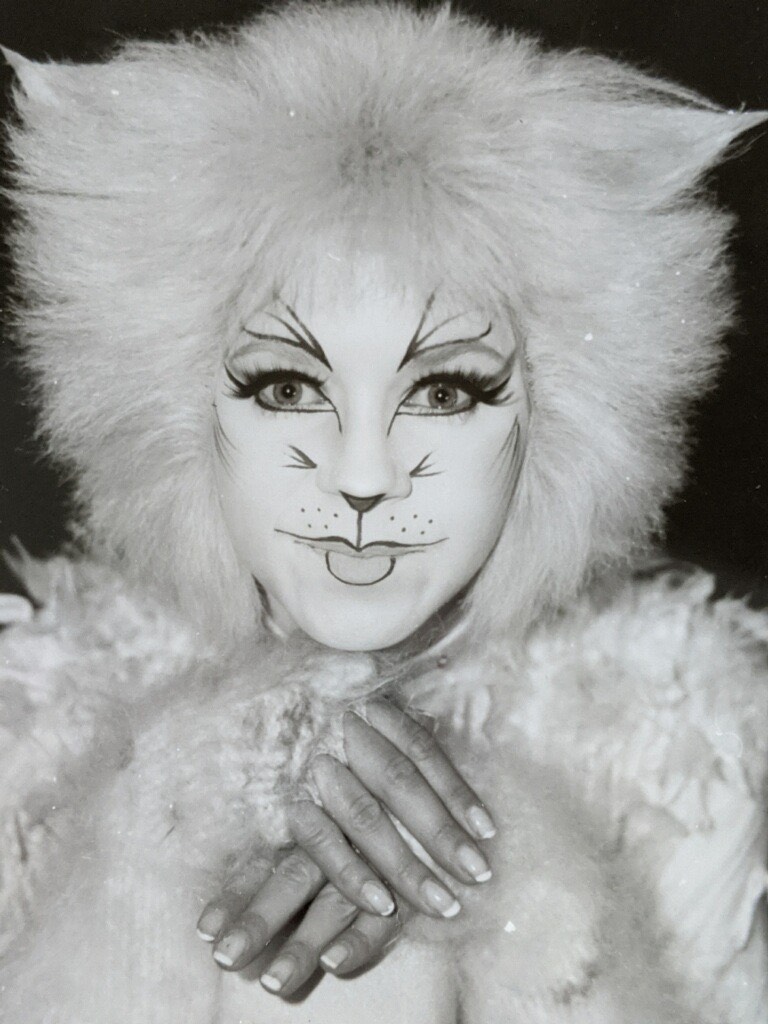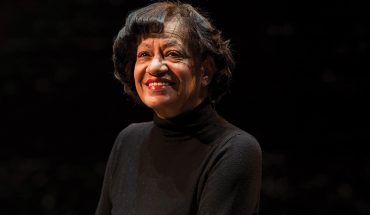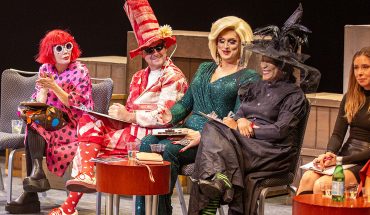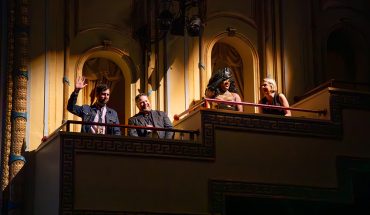This former Broadway dancer has dedicated her life to encouraging young talent as the founder of the N. C. Dance Institute.
by Katherine Cusack
Kirstie Spadie has lived what might be every dancer’s dream: playing the enchanting white cat, Victoria, in the musical Cats on Broadway.
Spadie grew up in New Orleans, a city infused with jazz, Motown and Mardi Gras. The city overflowed with cross-generational dancing — and her hand in his, Spadie’s father was always the first to hit the dance floor. In her teens, she trained at the Delta Festival Ballet of the Giacobbe Academy of Dance, then at the North New Orleans Center for Creative Arts and finally at the University of North Carolina School of the Arts, then went on to use her talents as a dancer and choreographer on Broadway. Some favorite credits include working as assistant director for the original Jerome Robbins choreography for West Side Story, traveling through Europe to perform in it, and an early-90s performance as Tiger Lily in Peter Pan at North Carolina Theatre with Terrance Mann.
In 2001, she cofounded the N.C. Dance Institute in Raleigh with her husband, Jay Spadie. For the past twenty years, she has been dedicated to coaching area dancers, creating a space where many professional performers from the Triangle got their starts. Victoria Moore is a former student and current teacher at NCDI. “Not only has she taught me that I must always point my toes and lengthen my lines, but she has shown me what it means to act with love, lead with grace and embrace new beginnings,” says Moore. “When you take a class with Kirstie, you feel her passion for dance in every step, turn and leap. She is a true gem in the Triangle arts community.”
I had the pleasure of not just chatting with Spadie, but hitting the dance floor with her. After she taught me four 8-count jazz steps in less than five minutes, we sat down to learn about her artistic footprint, advice for dancers and what makes her studio so unique.
You’ve performed and choreographed all over the world. What lessons have you brought back to your studio?
Early, early on in my teaching career, I taught with the National Dance Institute. The way I taught you that piece of choreography was classic process pedagogy: you teach small increments, and then build onto them. And you’ll notice I didn’t really use counts. I used words. And I also was pre-cueing you of what was coming next.
And from your time overseas?
With my work in China, I would have 50 kids that don’t really speak perfect English, so I would have to use a lot of signals like criss-cross applesauce, sit down, stand up. There’s all kinds of cues that you can use with kids. One thing that I learned from them was really helpful is that you can draw them in if you speak softly, or if you whisper, or if you don’t even speak at all; you just use your hands to demonstrate things. It really brings the attention from everyone to you as the teacher.
Do you remember your first dance classes?
I do. At first, it was very low key, like a recreational place. I didn’t really start serious dancing until I was 11 or 12. There were times when I didn’t enjoy it, so I stepped back from it. But I’m glad my mom gave me that space to make my own choices and push so hard. You know, a lot of parents want their kids to stay “in it to win it” the whole way. But I think you need to listen to kids a little bit when they’re tired so they can have their own introspective moment. Like, do I want to do this? Do I want to do this? I gravitated back to it. I went to North New Orleans Center for Creative Arts for high school, so I went to my regular classes during the day and the arts conservatory in the afternoon. From one until five, I was doing serious, serious dancing five days a week.
Do you feel like that’s required for people to get onto Broadway?
Yeah, absolutely — to shape the instrument and to get so comfortable with what you’re doing that it becomes effortless.
When you came to Raleigh, you saw a need for this dance studio that was technique and individual-based. How did your experiences shape your perspective?
With the onslaught of Dance Moms, the dance industry has gravitated toward this competitive edge. The dancers that I was seeing were burnt out and injured, and their financial burden was huge. I knew parents were looking for a different solution to this, so I said, let’s just focus on education. Let’s just focus on technique. I mean, we can still do choreography and have fun; but let’s find a life balance for kids and their families. So, you know, 20 years later, we have a great following of parents that just really, really want their kids to be balanced and not obsessed.
Why do you think the N.C. Dance Institute produces so many stars, and what makes it so unique?
Unique is completely correct. Our non-recital, non-competition philosophy is really for a niche market of parents who value education over an event. Our teachers are excellent and are laser-focused on technique and building up dancers for themselves — not for a team or a recital or a trophy. We are focused on helping each individual child progress to their abilities. Some have gone on to amazing careers in the arts, but many more are doctors, lawyers and teachers. Many N.C. Dance Institute alumni are dance teachers. This full circle of education in the arts started with a teacher’s gentle hand guiding them.
You’ve encouraged dancers such as Bree Branker and Robert Hartwell to audition for the University of North Carolina School of the Arts who later made it big. How does it make you feel to see your students become so successful?
In my studio, I have a quote by Goethe: “Correction does much, but encouragement does more.” Encouragement has to be authentic so the student knows they are cared for. If you truly care about someone, you know when it’s time to let them fly out of the nest. Robert and Bree needed more to propel them to the next level. UNCSA is really the jewel of dance conservatory training in the U.S. Now Bree is in law school at UNC-CH and Robert is a successful business entrepreneur. Dance instilled in them this tenacious work ethic.
I think being a dancer, especially for a young kid, is the first time they have to stand on their own feet without their moms or dads. It shapes a child’s desire to prove themselves to themselves. That’s what I saw with Robert and Bree. These kids were determined to present their authentic self. In the studio, you’re always saying bigger dance, bigger smile. That constant encouragement pushes their self-confidence. A lot of the kids that have come here, they had it in them. We just helped pull it out more.
Who should we know about on Broadway or in Hollywood today that has connections to N.C. Dance Institute?
Lindsey Mathias is from the area and she’s in a really avant-garde Broadway show called Sleep No More.
What inspires you locally?
Getting outside and being in nature. We live next to Umstead Park. I enjoy hiking and Jay, an ultra-marathoner, has ran the Umstead 100 twice. Umstead is perfect for his running passion. The NC Museum of Art is my favorite place for walking and talking with my girlfriends!
You co-direct for the Special Theatre Arts of Raleigh, alongside Terri Dollar and Tatiana Guy. How long have you guys been doing the N.C. Special Olympics?
In 2019, we were in the opening ceremonies for the N.C. Special Olympics at the PNC Arena. It was definitely the hugest thing I have ever done, and we performed alongside a high school choir. It was from The Greatest Showman, and it was just a beautiful way to celebrate people with special abilities that are just, to me, they’re completely normal and just so enthusiastic about being able to perform because they don’t get the opportunity very often. And it’s joyous. We’re doing it this summer, and we’re doing “I’m a Believer” from Shrek.
What advice would you give for people who love to dance? Someone like me?
Love your body. No matter what the size or shape, it is an incredible vehicle and finding that comfort with your own skin and your own body is so important for dance. I think what we’re doing here at North Carolina Dance Institute is truly beneficial in that respect because we’re not competing for anything. We’re not competing for a competition or against each other. Dancers here really are just doing it for themselves, and doing it for themselves with no fear of judgment, ever, ever. I mean, we have students, we have ladies that dance here, like, in their late 50s and 60s, and they will kill it.
What’s next for you?
Check back in on me in 20 years. I will still be kicking!




